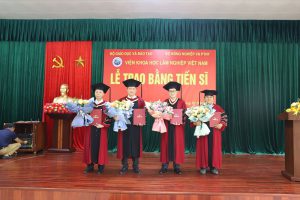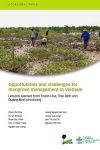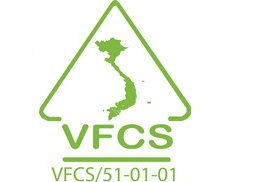Phi Hong Hai1, Doan Thi Mai1, Tran Ho Quang2
1 Research Centre for Forest Tree Improvement
2 Centre of Forestry Biotechnology
The national research project “Genetic improvement for some main planting tree species to increase plantation productivity and quality” in the period 2001-2005 was implemented by the Research Centre for Forest Tree Improvement, Forest Science Institute of Vietnam. The overall objective of the project was to improve plantation productivity and quality for some main planting tree species in Vietnam, and to contribute to improving stakeholder’s incomes and the competitiveness of the country. The objective was achieved through breeding, testing, selection of the best performing varieties, and releasing them to production via appropriate propagation methods. The project also aimed at maintaining genetic diversity of main planting tree species for future genetic improvement.
In the period 2001-2005 the project had successfully selected over 44 varieties of Acacias and Eucalypts that have high productivity, good stem form and disease resistance. Among those, 11 varieties had been approved by the Ministry of Agriculture and Rural Development as national and technological advance varieties for commercial planting in suitable ecological areas. The vegetative propagation technology by cutting and tissue culture had also been successfully developed for these genetically improved planting varieties.
The project has established breeding populations having high genetic diversity for some main planting tree species including Acacia (A. mangium, A. auriculiformis, A. crassicarpa), Eucalyptus (E. urophylla, E. pellita, E. camaldulensis, E. grandis and E. tereticornis) and Pinus (P. caribaea, P. kesiya and P. massoniana). These breeding populations are valuable sources for providing genetically improved seed for production and also important genetic resources for future breeding activities.The project has also successfully studied genetic control and the degree of genetic variation of growth traits and some economically valuable wood quality traits e.g. wood density, cellulose content, and mechanical wood properties for sawn timber production. The information is valuable for developing and optimizing breeding strategies that incorporate wood properties in breeding programs. Based on these studies, many clones of Acacia and Eucalyptus that have good growth and desired wood quality have been selected. They are being tested and the best performing clones will be released to production in the near future.
Latest news
- Project: Commercial-scale yield trial and completion of planting techniques for newly recognized acacia hybrid cultivars (BV586, BV376, BB055, BV584, BV523, BV434, BV350)
- Project: Research on selection and breeding of Acacia hybrid and Acacia auriculiformis for timber plantation in main ecological regions
- National seed orchard of Pinus merkusii
- National seed orchard of Acacia auriculiformis
- National seed orchard of Acacia mangium
Oldest news
- Selection of disease resistant eucalypt and acacia clones with high productivity for commercial planting
- Selection of Eucalypt and Acacia clones for disease resistance and high productivity, period 2001-2005
- In vitro budding capability of Aquilaria crassna Pierre
- Micropropagation of Shorea leprosula (meranti tembaga) using a temporary immersion system (RITA system)
- Growth performance of some dipterocarps and non-dipterocarps planted from rooted cuttings






